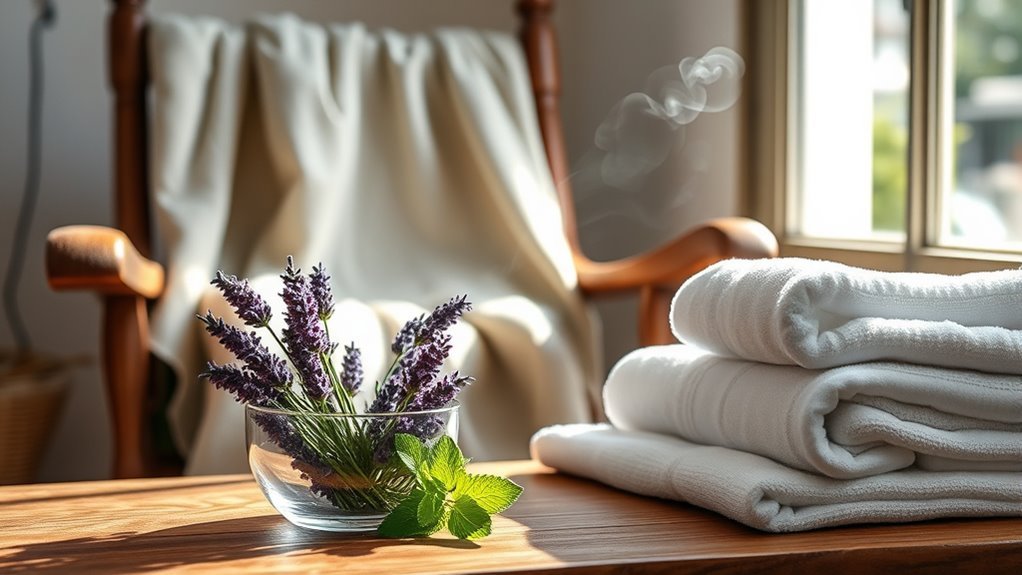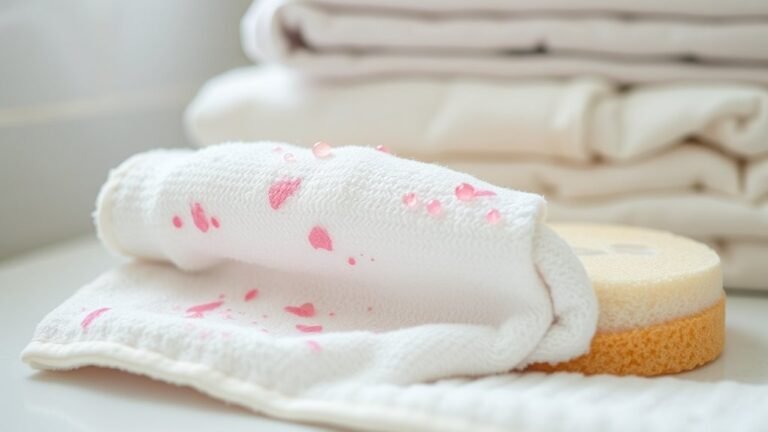Natural Cleaning Hacks for Your Blanket
You can keep your blanket fresh naturally by sprinkling baking soda to absorb odors, then vacuuming it off. For stains, mix equal parts white vinegar and water to spot clean gently without rubbing. Add a few drops of essential oils like lavender for a soothing scent. Wash with gentle plant-based detergents and air dry or tumble dry on low heat with dryer balls. Want to discover more eco-friendly tips to protect and maintain your cozy blankets?
Using Baking Soda to Remove Odors

Baking soda is a simple and effective way to freshen up your blankets. You’ll appreciate its natural baking soda benefits, especially its powerful odor absorption ability. Instead of relying on harsh chemicals, you can liberate yourself with this easy, eco-friendly method. Just sprinkle a generous layer of baking soda over your blanket, then let it sit for at least 30 minutes—longer if you can. This lets the baking soda absorb unwanted smells, leaving your blanket smelling clean and fresh. Afterward, shake off or vacuum the powder. It’s a straightforward step that fits perfectly in your desire for freedom from synthetic products and complicated routines. With baking soda, you’re choosing a natural, no-fuss way to keep your blankets inviting and fresh.
How to Spot Clean With White Vinegar
If you’ve used baking soda to refresh your blanket but notice a stubborn stain, white vinegar can be a great next step. Mix a vinegar solution by combining equal parts white vinegar and water in a spray bottle. Lightly spray the stained area, then gently blot with a clean cloth—don’t rub, as that can spread the stain. The natural acidity in the vinegar solution helps break down and lift stains without harsh chemicals, giving you effective stain removal while keeping your blanket fresh. After spot cleaning, let the blanket air dry completely before using it again. This simple method lets you maintain your blanket’s comfort and freedom from stains, all while using a natural, budget-friendly approach.
Refreshing Your Blanket With Essential Oils

To refresh your blanket naturally, start by choosing essential oils with soothing scents like lavender or eucalyptus. You’ll want to apply them carefully—diluted in water or on a cloth—to avoid any stains. This simple step can make your blanket smell fresh without harsh chemicals.
Choosing Essential Oils
When revitalizing your blanket with essential oils, choosing the right scent can make all the difference. You want to pick essential oil types that not only smell great but also promote relaxation or energy, depending on your mood. Lavender and chamomile are perfect for calming vibes, while citrus oils like lemon and orange boost freshness. Don’t be afraid to experiment with blending techniques—mix a few drops of complementary oils to create a unique scent that feels just right for you. Remember, the goal is freedom to customize your space with aromas that lift your spirit. Keep your blends simple and balanced, ensuring they’re not overpowering but still bring a fresh, natural touch to your blanket every time you use it.
Application Techniques
Spritzing or dabbing essential oils onto your blanket can instantly refresh its scent without overwhelming your senses. To do this effectively, you’ve got a couple of application methods at your disposal. Using a spray bottle filled with water and a few drops of your chosen essential oil lets you evenly mist your blanket, making it smell fresh without soaking it. Alternatively, you can dab a cotton ball or soft cloth—your simple cleaning tools—with diluted oil and gently press it onto specific spots for targeted freshness. Whichever method you choose, always test a small area first to confirm your fabric loves the oils as much as you do. These techniques give you freedom to keep your blanket cozy, clean, and naturally fragrant.
Washing Blankets With Gentle Natural Detergents
When washing your blanket, choosing detergents with mild, natural ingredients is key to protecting its fibers. You’ll find that plant-based detergents not only clean effectively but also reduce irritation and environmental impact. Switching to these gentle options helps keep your blanket soft and fresh without harsh chemicals.
Choosing Mild Ingredients
Since blankets often have delicate fibers, choosing mild ingredients is key to keeping them soft and intact. When you opt for natural ingredients, you’re not just protecting your blanket—you’re embracing freedom from harsh chemicals. Gentle options like baking soda, white vinegar, and castile soap offer powerful ingredient benefits without compromising fabric quality. These natural ingredients clean effectively while preserving softness and color vibrancy, letting you enjoy your blanket’s cozy comfort longer. Plus, they’re eco-friendly, so you’re caring for the planet as you care for your blanket. By carefully selecting mild ingredients, you guarantee a thorough yet gentle clean, freeing you from worries about damage or irritation. It’s a simple step that makes a lasting difference in your blanket’s life.
Benefits of Plant-Based Detergents
Choosing plant-based detergents brings a rejuvenating balance of effectiveness and care to washing your blankets. These eco friendly cleaning options gently lift dirt and odors without harsh chemicals, preserving your blanket’s softness and longevity. Since they’re made from natural ingredients, you’re choosing biodegradable options that break down easily, reducing environmental impact and freeing you from guilt about waste. Using plant-based detergents means you protect not only your fabrics but also the planet, supporting a cleaner, greener lifestyle. You’ll enjoy fresh, clean blankets without sacrificing your values or the earth’s health. Embracing these gentle, sustainable choices lets you clean with confidence, knowing you’re making a positive difference every time you wash.
Drying Techniques to Preserve Blanket Softness

How you dry your blanket plays an essential role in keeping it soft and cozy. To preserve that comforting feel, air drying is your best friend. Hanging your blanket outside or in a well-ventilated space lets it dry gently, avoiding heat damage and maintaining its natural fluffiness. If you prefer tumble drying, choose a low heat or delicate setting to prevent fibers from stiffening. Toss in a couple of clean tennis balls or dryer balls to keep the blanket light and airy. Avoid high heat, which can cause shrinkage and roughness. By mastering these drying techniques, you’ll extend your blanket’s life and enjoy its softness every time you wrap yourself up, free from worry about ruining its comfort.
Removing Stains With Lemon Juice and Salt
When stains appear on your blanket, you don’t have to reach for harsh chemicals—lemon juice and salt offer a natural, effective solution. Simply squeeze fresh lemon juice onto the stain, then sprinkle a salt mixture over the area. The acidity in lemon juice breaks down the stain, while the salt acts as a gentle abrasive, lifting the mark without damaging the fabric. Let the mixture sit for about 30 minutes under sunlight to boost its stain removal power. Afterward, rinse with cold water and launder as usual. This method frees you from relying on synthetic cleaners, keeping your blanket fresh and safe. By choosing this simple, natural approach, you embrace freedom from harsh chemicals and care for your blanket in an eco-friendly way.
Using Hydrogen Peroxide for Whitening
Although it might seem strong, hydrogen peroxide is a gentle and natural way to whiten your blankets without harsh chemicals. You can easily harness its power for blanket whitening by mixing one part hydrogen peroxide with two parts water in a spray bottle. Lightly mist your blanket, focusing on yellowed or dull areas, then let it sit for about 15 minutes. This process breaks down stains and brightens fibers, restoring your blanket’s fresh, clean look. Afterward, just rinse thoroughly or toss it in the washing machine for a full clean. Using hydrogen peroxide lets you take control of your blanket care, freeing you from reliance on expensive or toxic products. It’s a simple, effective hack to keep your blankets looking bright and inviting naturally.
Preventing Mold and Mildew Naturally
Since blankets often trap moisture, preventing mold and mildew naturally is key to keeping them fresh and safe. You can boost mold prevention by regularly airing out your blankets in sunlight. Sunlight’s UV rays help kill mold spores and encourage mildew resistance. Another simple trick is to sprinkle baking soda on your blanket before washing; it absorbs excess moisture and odors that invite mold growth. Using natural essential oils like tea tree or lavender in your wash cycle also adds a mildew-resistant boost. Remember, avoiding synthetic chemicals means you’re choosing a healthier, freer lifestyle for both you and the environment. By incorporating these natural habits, you’ll keep your blankets cozy, clean, and mold-free without compromising your values.
Storing Blankets to Maintain Freshness
To keep your blankets fresh for longer, you’ll want to store them properly between uses. Good blanket storage prevents musty odors and fabric damage, letting you enjoy that cozy freedom anytime. Here are simple freshness tips to help you out:
| Storage Tip | Why It Works |
|---|---|
| Use breathable cotton bags | Allows air circulation |
| Add natural sachets | Keeps pests and smells away |
| Store in a cool, dry place | Prevents mold and mildew growth |
Avoid plastic bags—they trap moisture, leading to mildew. Instead, opt for natural materials and keep your blankets in a spot with moderate temperature. These small steps will keep your blankets feeling fresh and ready whenever you want to wrap yourself in comfort.
Frequently Asked Questions
Can Natural Cleaning Harm Delicate Blanket Fibers?
Like walking on eggshells, cleaning delicate fibers demands care. You shouldn’t underestimate fiber sensitivity; even natural cleaning methods can sometimes cause damage if you’re not cautious. You’ve got to choose gentle cleaning techniques that respect your blanket’s texture, avoiding harsh scrubbing or strong acids. When you handle your blanket with freedom and knowledge, you’ll preserve its softness and longevity without feeling trapped by complicated care routines.
How Often Should I Naturally Clean My Blanket?
You’ll want to follow frequency recommendations based on your lifestyle and blanket use, but generally, giving your blanket a natural cleaning every few months works well. Seasonal cleaning is a great approach—freshen it up in spring and fall to keep it feeling cozy and clean. If you use it daily or have allergies, you might want to clean it more often. Trust your instincts and enjoy that freedom to care for your blanket naturally!
Are Natural Cleaning Methods Safe for All Blanket Materials?
Like fitting a key to the right lock, natural cleaning methods depend on fabric compatibility to release their full cleaning effectiveness. You’ll find they’re generally safe, but delicate materials like silk or cashmere might need gentler care. Always check your blanket’s label and test a small area first. This way, you keep your freedom to choose green cleaning without risking damage, ensuring your blanket stays cozy and fresh.
Can I Use Natural Cleaners on Weighted Blankets?
You can use natural cleaner options on your weighted blanket, but you’ve gotta be careful with weighted blanket care. Since weighted blankets often contain glass beads or pellets, avoid soaking them or using harsh chemicals. Lightly spot clean with a gentle natural cleaner like diluted vinegar or mild soap, then air dry. Always check the care label first—this way, you keep your blanket fresh without sacrificing its cozy weight or your freedom to enjoy it.
How Do Natural Cleaning Hacks Compare to Commercial Products?
Imagine choosing between a home-cooked meal and fast food—you might find natural cleaners less flashy but more nourishing for your blanket. When you do an effectiveness comparison, natural options gently clean without harsh chemicals, preserving fabric quality. Plus, cost analysis shows they’re often cheaper long-term since you’re using simple ingredients. If you crave freedom from toxins and pricey products, natural hacks give you that clean, fresh feeling without compromise.






